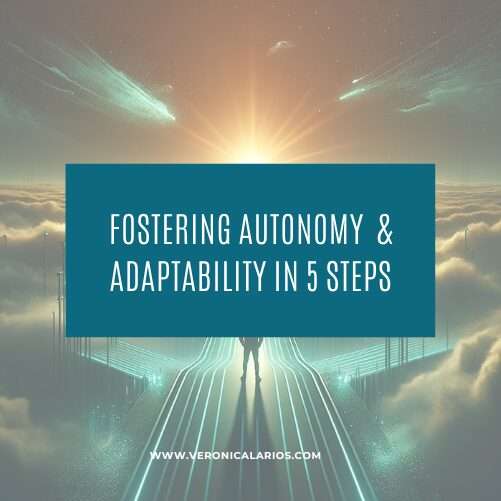In today’s rapidly evolving business landscape, fostering autonomy and adaptability in leadership is crucial for shaping an organization’s culture and driving its success.
Recent research underscores the significant impact of leadership styles on employee motivation, innovation, and overall performance, highlighting the importance of empowering teams. My journey in fostering autonomy and adaptability began within the walls of an office. There I collaborated with a company leader who preferred trust over micromanagement. This approach allowed me to experiment within broad parameters, leading to innovative solutions that many times became new standards for the company. This experience taught me that true innovation emerges not from strict adherence to rules but from the courage to explore new paths.
Now, as a consultant, I guide clients in building processes centered on adaptability and autonomy. It’s fascinating how the principles of fostering autonomy and adaptability have come full circle in my career. Yet, the challenge remains when leaders stick too closely to the “if it ain’t broke, don’t fix it” mantra, potentially stifling innovation and demotivating their team. I’ve heard responses from some leaders like, “It’s working fine, why mess with it?” which can demoralize their team. This has lead to silence during meetings and a lack of innovation and input by the team.
A 2023 study by the Institute for Corporate Productivity found that companies prioritizing autonomy and adaptability witnessed a 30% increase in innovation outputs and a significant rise in employee satisfaction. This demonstrates the power of fostering autonomy and adaptability in creating a dynamic and innovative workplace. While we don’t have to give all control we can make a few adjustments that can make a big difference in the workplace.
Here’s how leaders can foster autonomy and adaptability in their teams:
Listen Actively
Cultivate a culture where every voice is valued. By encouraging open dialogue and feedback in individual and group conversations, you foster a sense of belonging and respect. This is essential for innovation and trust to start building. Active listening is a cornerstone in fostering autonomy and adaptability, as it allows leaders to understand and act upon team insights. Many times leaders are already thinking of what to say as the boss instead of asking questions as to WHY they are voicing this idea. Asking why and what brought them to that insight can be eye opener of an area that needs attention in the business.
Set Clear Parameters and Deadlines
While embracing autonomy, it’s vital to define clear goals and boundaries. Providing the opportunity to try something new is great, yet setting clear expectations and deadlines let’s them know what is required. For example, a client’s team wanted to design a brand new type of questionnaire for their clients. The boss let them try it as a test pilot but gave them the needed information that had to stay and a deadline for them to circle back on it. This balance ensures that creativity aligns with organizational objectives, guiding teams without restricting their innovative potential.
Encourage Autonomy
Empower team members by granting them the freedom to work within defined guidelines. Ask what support or tools they need, showing trust while enabling them to own their projects. This empowerment fosters a culture where trying new ideas is encouraged, knowing there is support if needed.
Reward and Discuss
Recognizing achievements and learning from setbacks are pivotal. Things don’t always work. Instead of saying “I told you so, its my way or the highway” approach, take the moment to recognize them. It takes courage to try and there is always a learning opportunity from it. If it did work, recognize that as well, praise that success. This approach not only motivates but also builds a resilient culture that values adaptability and continuous improvement, essential components in fostering autonomy and adaptability.
Embrace Change
In an ever-changing world, adaptability is key to success. Business is constantly evolving, tech and AI evolve, so encourage your team to be open to change. Being ready to pivot based on new insights ensures that your organization stays ahead of the curve.
Remember, it is not just about changing processes. As a leader, nurturing an environment where innovation thrives, ideas flourish, and teams feel empowered is key.
Are you ready to lead with adaptability and autonomy? If you aim to strengthen your team, refine your processes, or explore innovative leadership strategies, reach out. Together, we can foster a culture of autonomy and adaptability, setting the stage for success. Let’s embark on a journey to unleash the full potential of your leadership and team.


